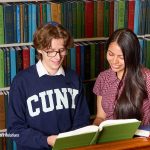The Core 100 program invites students and faculty from the College to join us for our weekly lecture series. Each week, all of the first-year students participate in lecture-discussions with about 400 of their classmates. We have space in the Center for the Arts (Building 1P) Williamson Theatre to accommodate individual guests (no permission needed) and can have as many as two additional classes at each of the lectures. Permission is not necessary for classes to attend, but please notify Donna Scimeca at 718.982.3405 if you plan to bring a class.
The lectures are 50 minutes in length and are all in the Williamson Theatre. They meet on the following days/times: Wednesdays at 12:20pm and on Thursdays at 8:00am, 10:10am, 4:40pm, and 6:30pm.
In the fall, the Saturday 10:10am lectures are held in the Williamson Theatre, but due to space limitations, we unfortunately cannot accommodate additional classes.
The Lecture Series schedule for the Week of Apr. 18. 2016 is as follows:
Wednesday, Apr. 20:
-12:20pm: “Management v. Labor: How Unions Gained Recognition in America by Government and Business,” presented by Arthur Cacace
This lecture will discuss the struggle of the labor movement in the U.S., and how both government and business gradually began to modify their views on labor unions, and their right to recognition as bargaining agents for U.S. workers.
Arthur Cacace earned his Master of Science degree in Social Studies Secondary Education from the College of Staten Island. He has taught social studies in the NYC Public School System and has been an Adjunct Professor for Core 100 since 2008.
Thursday, Apr. 21:
-8:00am and 10:00am: “The Economy and the Government’s Role: Part 2 – The Modern Econom,y” presented by John Lentine
This lecture starts by examining the economic theories that pulled us out of the Great Depression and ultimately led to American prosperity. It will then look at the economic downturn of the 1970s and the policies that Ronald Reagan used to allow the Bull to run loose. We will ultimately analyze the causes of the Great Recession and what attempts were made to soften the blow.
John Lentine graduated from the Pennsylvania State University – Capital College, with a Bachelor’s degree in Public Policy and a Master’s degree in Public Administration. Studying just outside the State Capitol, he had the distinct honor of working for two of Pennsylvania’s State Representatives. Upon his return to Staten Island, he worked on a City Council campaign management team. He currently works in the Center for Advising and Academic Success and teaches Core 100 at the College of Staten Island. Recently, with many of his esteemed colleagues, he has also served on the CORE 100 textbook editing committee.
-4:40pm: “A Review of Reality: Understanding Context, Perspective, and Incentive in Modern Economics,” presented by David Jacobsen Loncle
This lecture will contain a review of the role of the citizen in the U.S. during global crisis. Particular emphasis will be put on the meetings in Paris regarding climate change, the scale of the problems, and what we can do as individuals.
David Jacobsen Loncle is a painter, philosopher, writer, gardener, and passionate educator. He has taught painting and drawing as an Adjunct Assistant Professor at CSI since 2010 and has taught in the CORE program since 2015. David’s is an example of the developing status-quo for higher education faculty who are forced to split their time between making a living and engaging in academic and creative endeavors. He is currently working on a book compilation of the writings of the late CSI Art Professor, Pat Passlof.
-6:30pm: “The Labor Movement and Industrialization in the Cross-hairs,” presented by Vincent DePaolo
As industrialization continued to flourish after the Civil War and into the 20th Century, a new group has emerged. The labor movement, specifically the unions, were on the front lines of fighting for workers’ rights and the ability for the average American to have a middle-class job and wage.
Professor DePaolo is teaching Core 100 for the fourth semester. He was previously an Adjunct Instructor at Long Island University – Brooklyn Campus in the History Department teaching introductory world history survey courses. He received his BA in History and MS in Social Science with a concentration in History, and Advanced Graduate Certificate in United Nation Studies at Long Island University – Brooklyn Campus. He has also received his MSEd in Secondary Social Studies from the College of Staten Island.














